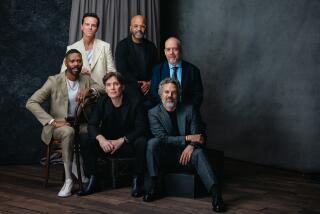KIDS ON FILM : Relentless ‘Bobby Fischer’ Strikes Empathetic Note
- Share via
In “Searching for Bobby Fischer,” 7-year-old Josh (Max Pomeranc) displays a genius for chess but risks becoming a pawn of adults when his competitive father, protective mother, highbrow coach and lowbrow coach disagree over what’s best for him. (Rated PG)
*
Play to win. It’s just a game.
Play it safe. Take risks.
Despise your opponent. Be nice.
When the adults in his life offer conflicting guidance, what’s a talented kid to do?
Josh’s dilemma provoked plenty of empathy from young viewers of this most recent addition to a summer spate of family films. But overall, they were less enthused than their parents about this story in which the child manages somehow to please all the adults. And still win every single game.
Dressed in a sports jersey and baseball cap, David, 11, said that adults do sometimes push kids too hard to win and that the movie showed that well. “At first, his father was too hard on him. The chess master was hard on him too.”
David said the chess master (Ben Kingsley) stood out as a particularly cruel grown-up for trying to prepare Josh for disappointment by building up his hopes and then disappointing him. “It was a good movie,” David said tentatively. But he thought it could have been improved if Josh had lost a match once in a while.
When Josh begins to win tournaments and face the pressure of being the one others want to beat, he says, “Maybe it’s better not to be the best--then you can lose and it’s OK.” But he is the best and keeps on winning anyway.
Losing isn’t the end of the world, David said. Whenever he loses at soccer, he said, “you learn something.”
The adults in the movie presumably learned a thing or two about pushing kids in competition, particularly when Josh’s father tries to reverse himself by telling Josh, “It’s just a game,” and Josh replies coldly, “No, it isn’t.”
The adults in the audience--undoubtedly a stage parent or two among them--could relate. They laughed loudest at a scene in which a chess tournament organizer opens a match by admonishing a group to “conduct yourselves like adults.” It is then revealed that he is speaking to the parents. Later, they need to be locked behind a fence so they don’t harass their children as they are trying to play.
But most kids gave the movie only three or four stars out of a possible five.
Filmed with a chiaroscuro style, the scenes of musty rooms in old New York buildings were dreary and dark. Plus, the nice-guys-finish-first message of the movie proved elusive for some younger kids still emersed in the black/white, win/lose, good/bad world of childhood.
In fact, talking about what Josh had learned about handling the pressures of competition, the kids came away with ideas they had probably already learned elsewhere.
“Playing chess taught him lessons, like, always try your best,” concluded Jennifer, 9. “But don’t get really depressed.”
The lesson for Monica, 9, was if you want to win, you have to practice.
For Ryan, 7, it was, “Never give up.”
But David understood the film’s main message to be contained in the advice Josh gets from his friend, a homeless chess player in the park: “He showed him how to have fun, too.”
More to Read
Only good movies
Get the Indie Focus newsletter, Mark Olsen's weekly guide to the world of cinema.
You may occasionally receive promotional content from the Los Angeles Times.










